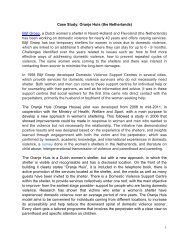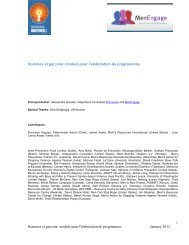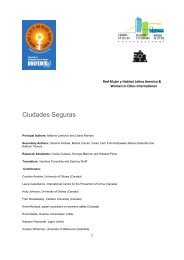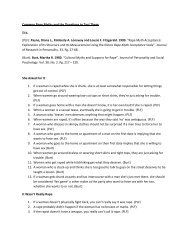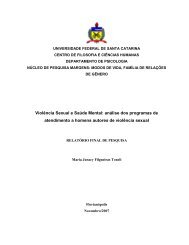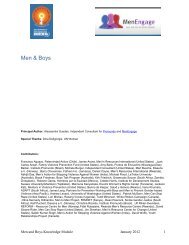Campaigns to End Violence against Women and Girls - Virtual ...
Campaigns to End Violence against Women and Girls - Virtual ...
Campaigns to End Violence against Women and Girls - Virtual ...
Create successful ePaper yourself
Turn your PDF publications into a flip-book with our unique Google optimized e-Paper software.
hesitate <strong>to</strong> talk about it. Surveys must be carefully designed <strong>to</strong> account for the sensitivity<br />
of the issue.<br />
Examples: As part of the formative part of its moni<strong>to</strong>ring <strong>and</strong> evaluation framework, a<br />
baseline survey was conducted in the Bell Bajao campaign in India <strong>to</strong> gather statespecific<br />
information on gender-based violence, domestic violence, women’s rights <strong>and</strong><br />
related legal provisions (Protection of <strong>Women</strong> from Domestic <strong>Violence</strong> Act). In addition,<br />
the baseline recorded the target audience’s media habits, <strong>and</strong> the information sources<br />
they used <strong>and</strong> preferred. Secondary data sources were also used eg. from the WHO<br />
<strong>and</strong> the National Family Health Survey in India.<br />
Read the campaign Baseline Survey on Domestic <strong>Violence</strong> <strong>and</strong> HIV/AIDS.<br />
The International Center for Research on <strong>Women</strong> <strong>and</strong> Institu<strong>to</strong> Promundo Men<br />
<strong>and</strong> Gender Equality Policy Project, launched in 2007 aims <strong>to</strong> enhance the body of<br />
knowledge on how policies can encourage men <strong>and</strong> boys <strong>to</strong> participate in promoting<br />
gender equality <strong>and</strong> ending violence <strong>against</strong> women. To determine the baseline<br />
attitudes, knowledge <strong>and</strong> practices of men <strong>and</strong> women, the International Men <strong>and</strong><br />
Gender Equality Survey (IMAGES) was developed - a st<strong>and</strong>ardized population-based<br />
questionnaire administered by using a mobile <strong>to</strong>uch pad, where respondents are asked<br />
a question verbally <strong>and</strong> then are asked <strong>to</strong> press a color on the screen <strong>to</strong> indicate their<br />
response. This method does not require the participant <strong>to</strong> be literate <strong>and</strong> maintains the<br />
praticipant’s anonymity <strong>and</strong> confidentiality. The men’s questionnaire is available in<br />
English <strong>and</strong> Portuguese. The women’s questionnaire is available in English <strong>and</strong><br />
Portuguese.<br />
Additional guidance: The section on Baseline Assessment in the Programming<br />
Essentials Module provides detailed information on baseline data collection <strong>and</strong> further<br />
resources.<br />
Tools <strong>and</strong> Sample Baseline Surveys:<br />
� Baseline Surveys on Social <strong>and</strong> Institutional Tolerance of Gender-based<br />
<strong>Violence</strong> in Colombia (Spanish) – These baseline survey instruments were<br />
developed under the auspices of the multi-sec<strong>to</strong>r programme on gender-based<br />
violence in Colombia, incorporating elements that are comparable with some of the<br />
aspects of both the WHO Multi-country Study <strong>and</strong> the International Men <strong>and</strong> Gender<br />
Equality Survey (see below).<br />
� <strong>Violence</strong> Against <strong>Women</strong> Survey Guides, Madagascar, USAID/<strong>Women</strong>’s Legal<br />
Rights Initiative, 2004 (in French) – This resource is for practitioners <strong>and</strong> researchers<br />
working on violence <strong>against</strong> women. The guides comprise six different qualitative<br />
surveys for women <strong>and</strong> men of different ages <strong>and</strong> relationship status as well as a<br />
survey pre-selection form.<br />
� International Men <strong>and</strong> Gender Equality Survey (IMAGES), International Center for<br />
Research on <strong>Women</strong> <strong>and</strong> Institu<strong>to</strong> Promundo, 2010 (in English <strong>and</strong> Portuguese) –<br />
This survey was developed <strong>to</strong> strengthen underst<strong>and</strong>ing of men’s behaviours <strong>and</strong><br />
attitudes, <strong>and</strong> changes in those attitudes <strong>and</strong> behaviours. The ultimate goal of the<br />
survey is <strong>to</strong> inform, drive <strong>and</strong> moni<strong>to</strong>r policy development <strong>to</strong> promote gender equality<br />
by engaging men <strong>and</strong> women in such policies.<br />
� A Guide <strong>to</strong> Developing Knowledge, Attitude <strong>and</strong> Practice Surveys, World Health<br />
Organization/S<strong>to</strong>p TB Partnership, 2008 – This comprehensive manual produced by<br />
the World Health Organization in cooperation with the S<strong>to</strong>p TB Partnership provides<br />
275<br />
<strong>Campaigns</strong> December 2011



